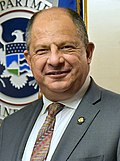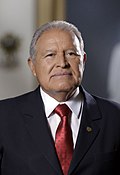| Presidency pro tempore of the Community of Latin American and Caribbean States | |
|---|---|
 | |
| Constituting instrument | Community of Latin American and Caribbean States |
| Inaugural holder | |
| Formation | 3 February 2011 |
The Presidency pro tempore of the Community of Latin American and Caribbean States is the office that represents the Community of Latin American and Caribbean States in international events.













